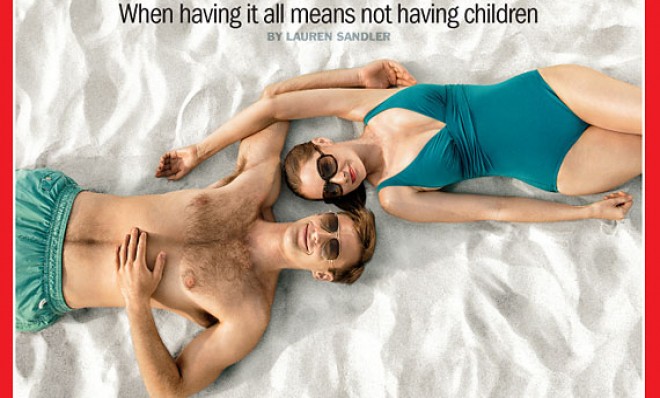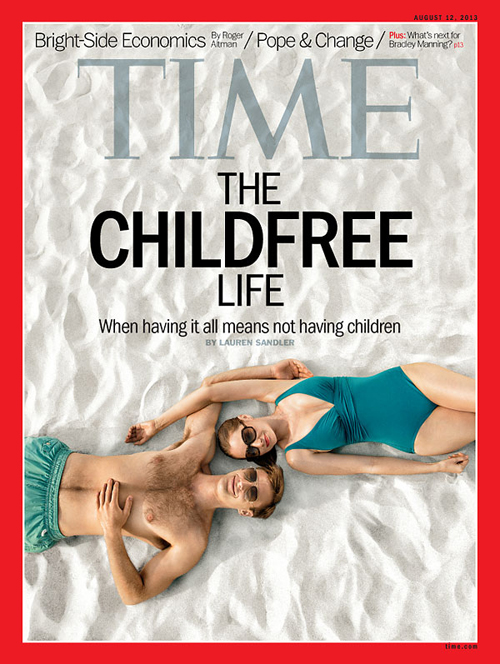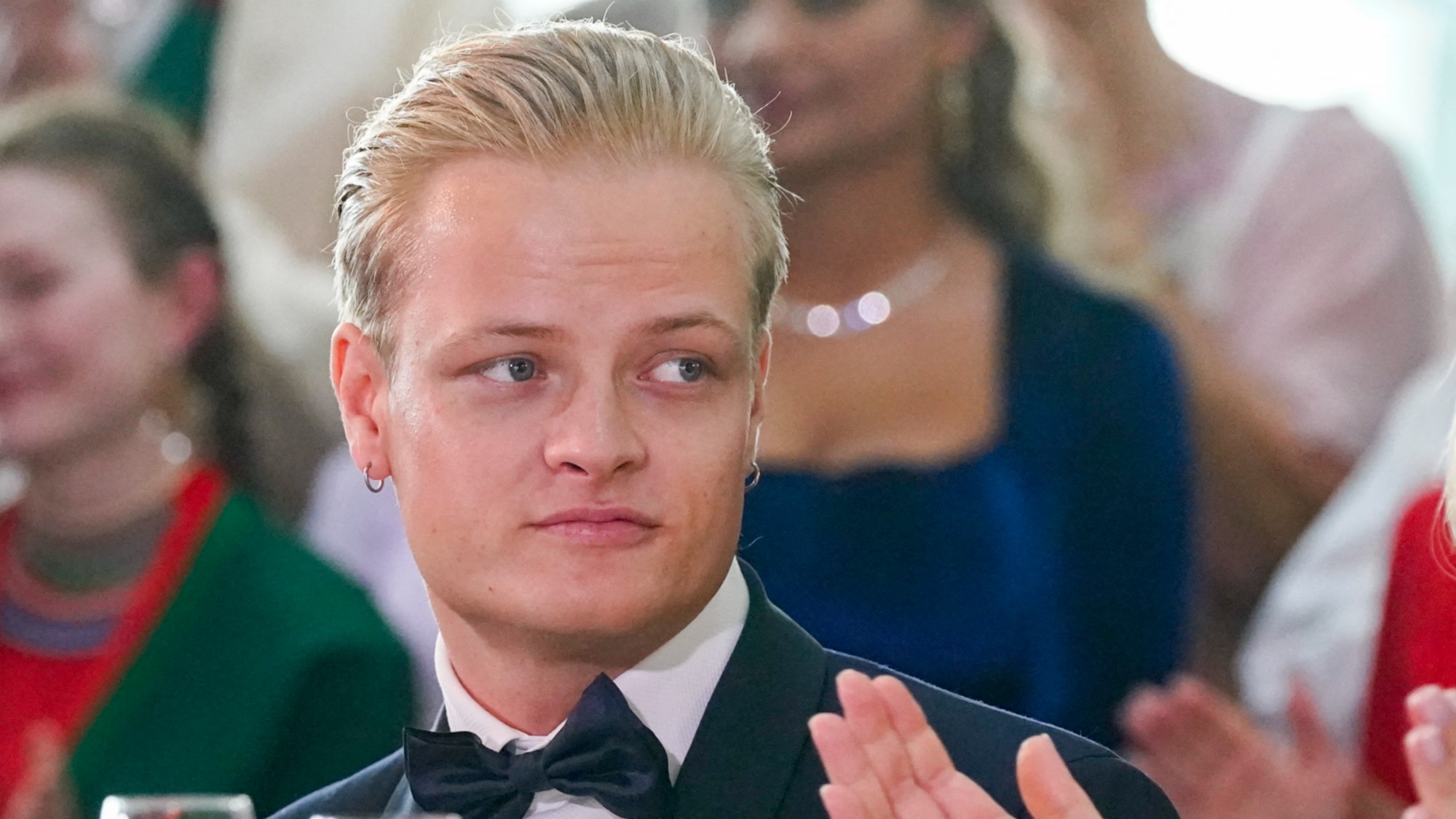The problem with TIME's cover story on the child-free life
And what it says about our attitudes toward the childless


Earlier this year, TIME shined a "shocking" spotlight on the rise and lifestyle of Millenials, earning widespread mockery. This week, the magazine is declaring a new demographic a group of interest: The child-free.
The latest issue features a cover story called "The Childfree Life: When having it all means not having children," by Lauren Sandler, who recently garnered attention for her book One and Only on the benefits of having just one child. Now, Sandler is exploring the lives of people who opt to have zero children, asking why they choose to reject the tide of pressure to have babies.
There are many commendable aspects to Sandler’s article. For one, she backs up the child-free trend with some hard numbers and interesting statistics. She cites a 2010 Pew Research report that shows that about one in five American women never have children, up from one in ten in the 1970s. She also demonstrates that the trend was in swing even before the recession provided extra economic incentives not to have kids, noting that by 2008, the proportion of women ages 40 to 44 who had never given birth had grown by 80 percent.
The Week
Escape your echo chamber. Get the facts behind the news, plus analysis from multiple perspectives.

Sign up for The Week's Free Newsletters
From our morning news briefing to a weekly Good News Newsletter, get the best of The Week delivered directly to your inbox.
From our morning news briefing to a weekly Good News Newsletter, get the best of The Week delivered directly to your inbox.
Moreover, Sandler does a great job of emphasizing that people who choose not to have children are doing so for a whole bunch of reasons, not just out of economic hardship (though that wouldn’t be a bad justification, considering that on average it takes $234,900 to raise a child born in 2011). She includes interviews with women who are significantly happier with their friends, family, travel, and jobs because they have chosen not to become parents. "I do all sorts of things: buy an unnecessary beautiful object, plan trips with our aging parents, sleep in, send care packages to nieces and nephews, enroll in language classes," says Jenna Johnson, one of the women featured in the article.
Johnson’s positive feelings are emblematic of all the women interviewed. Gone are the regretful women who wished they’d had children when they could; this article actually shows women from their twenties through their fifties relishing their choice not to procreate.
Unfortunately, one of the biggest problems with the piece is that pretty much only women are interviewed. There are one or two male voices, but the child-free opinions come mostly from the ladies. Sandler tries to justify it by explaining that most of the pressure to procreate falls on women, or as Pamela Smock of the University of Michigan says in the piece, "Childlessness defaults to women."
Still, by essentially choosing not to question men about their decisions to remain child-free because society already gives them a "free-pass," Sandler does a disservice to the issue. "Where, in Lauren Sandler’s examination of the ‘maternal instinct,’ is a question about the paternal one?" presses Mary Elizabeth Williams at Salon. "Where, in any of it, is the thoughtful, reasoned voice of a guy who just doesn’t want to be on the daddy track?"
A free daily email with the biggest news stories of the day – and the best features from TheWeek.com
And when women end up being nearly the only ones featured in a cover story on childlessness, the article ultimately adds to the extreme pressure on women to have children. "Wouldn’t it be grand if TIME remembered that having children — and not having them — isn’t something that only happens to women?" wonders Williams.
Moreover, even if the article had featured a balance of the sexes, do we really need good old TIME to tell us it’s okay not to have babies? Does TIME even think it actually is okay not to have kids? While Sandler’s piece has its strong points, the cover of the magazine is a little obnoxious, suggesting that there is actually something abnormally selfish about foregoing children. It features a heterosexual couple in turquoise swimsuits lounging on the beach looking more than relaxed, even smug. As Sarah B. Weir at Yahoo! Shine says, "They look like lazy yuppies to me. The matching swimsuits reek of self-satisfied, in-your-face DINKS (double income no kids)."
The issue also includes some other pieces on being child-free, including a very thoughtful personal essay. Still, the overall tone of the issue can sometimes feel like TIME is investigating a foreign, fascinating species, further ostracizing people who choose not to have children as some strange aberration from mainstream society.
But it seems like the child-free are the least likely to take offense. If we learn anything from Sandler’s article it’s that people who have chosen not to have children are over the haters and naysayers. "When I was younger I found it more exhausting," says Eleanor Wells, a woman in her mid-fifties who has been constantly questioned about her decision not to have children. "Now, I don’t give a s--- what anyone thinks."
Emily Shire is chief researcher for The Week magazine. She has written about pop culture, religion, and women and gender issues at publications including Slate, The Forward, and Jewcy.
-
 Norway’s scandal-hit royals
Norway’s scandal-hit royalsIn the Spotlight Rape trial of Marius Borg Høiby, son of the crown princess, adds to royal family's ‘already considerable woes’
-
 The Beckhams: the feud dividing Britain
The Beckhams: the feud dividing BritainIn the Spotlight ‘Civil war’ between the Beckhams and their estranged son ‘resonates’ with families across the country
-
 Quiz of The Week: 24 – 30 January
Quiz of The Week: 24 – 30 JanuaryQuiz Have you been paying attention to The Week’s news?